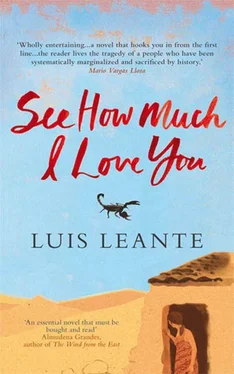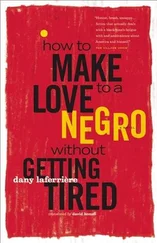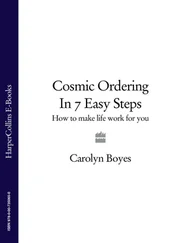Luis Leante - See How Much I Love You
Здесь есть возможность читать онлайн «Luis Leante - See How Much I Love You» весь текст электронной книги совершенно бесплатно (целиком полную версию без сокращений). В некоторых случаях можно слушать аудио, скачать через торрент в формате fb2 и присутствует краткое содержание. Год выпуска: 2009, Издательство: Marion Boyars, Жанр: Современная проза, на английском языке. Описание произведения, (предисловие) а так же отзывы посетителей доступны на портале библиотеки ЛибКат.
- Название:See How Much I Love You
- Автор:
- Издательство:Marion Boyars
- Жанр:
- Год:2009
- ISBN:нет данных
- Рейтинг книги:5 / 5. Голосов: 1
-
Избранное:Добавить в избранное
- Отзывы:
-
Ваша оценка:
- 100
- 1
- 2
- 3
- 4
- 5
See How Much I Love You: краткое содержание, описание и аннотация
Предлагаем к чтению аннотацию, описание, краткое содержание или предисловие (зависит от того, что написал сам автор книги «See How Much I Love You»). Если вы не нашли необходимую информацию о книге — напишите в комментариях, мы постараемся отыскать её.
“With vivid imagery of desperate village life and keen insight into multicultural influences, Leante’s rich, often poetic novel of romance and international politics evokes a sensuous yet savage period in this region’s tumultuous history.”— A huge bestseller in Spain,
won the 2007 Alfaguara Prize. An epic love story: Montse and Santiago meet as teenagers in 1970s Barcelona, a poor boy and a middle-class girl ready for seduction. After they break up, Santiago flees to the western Sahara. Years later, Montse braves war and personal danger to find him.
Luis Leante
See How Much I Love You — читать онлайн бесплатно полную книгу (весь текст) целиком
Ниже представлен текст книги, разбитый по страницам. Система сохранения места последней прочитанной страницы, позволяет с удобством читать онлайн бесплатно книгу «See How Much I Love You», без необходимости каждый раз заново искать на чём Вы остановились. Поставьте закладку, и сможете в любой момент перейти на страницу, на которой закончили чтение.
Интервал:
Закладка:
Her bedroom, on the other hand, was just the way she remembered it. When she sat down on the bed in which she’d slept as a girl, she felt a pang of nostalgia. But she couldn’t cry. For the last two months her tear ducts had refused to shed any more tears. She lay down on the bed, rested her head on the pillow and put her feet on the blanket. She fleetingly remembered how much that used to annoy her mother and smiled at the thought of what she would say if she saw her now. She recognised the cracks in the ceiling as if she hadn’t been away for twenty years. The shadows cast by the chandelier in the middle of the room made shapes: a top hat, near the window; a snail, in the centre; Franco’s profile. She smiled, overcome with emotion. Irrepressible images and sensations surfaced. She closed her eyes, the smile always on her lips, trying to believe that time had not gone by, that she was still eighteen and her life had not taken a nosedive. The noise of cars crept in on her thoughts and acted as a powerful soporific.
She woke up with a start. She’d dreamt that the phone was ringing and no one had picked up. Holding her breath, she tried to separate dream from reality. It was hard to tell how long she’d been asleep. The echo of the phone still resonated in her head, but it wasn’t real. For a moment she thought that Mari Cruz would open the door and say: ‘The phone, señorita . It’s for you.’ But the door wouldn’t open. The phone had been disconnected for ten years. She was over forty now, and the dead did not return from their graves just like that, as if nothing had happened. She sat up and looked for the cigar box in the drawer of the night-table. She put it on the bed and took out a hair clip, a box of matches, old stamps, a one-peseta coin, a museum ticket, lipstick. The letters were tied together with red ribbon.
She had found them in her mother’s jewellery case. She remembered it well. Her sister had been sitting across the table, the case between them like a recently exhumed coffin. They both knew neither would wear their mother’s jewels, but couldn’t leave them there: they were worth too much money. It had been her sister who’d finally opened the case and sorted them into two piles. She looked like a professional valuer. She had seen them so many times that she was capable of listing them and their price without opening the case. After taking out the last pearl necklace, she went on looking at the bottom of the case. ‘This is yours,’ she said. Montse looked at her, turning pale, as if she expected to find a Saint’s preserved finger. She put her hand in the case and took out a bunch of letters tied with red ribbon. ‘No, I don’t think it is,’ Montse replied, without looking at them. Her sister leaned back on her chair and lit up a cigarette. ‘It is now.’ Montse felt a shiver down her spine. She untied the ribbon and instantly recognised her own name and the Vía Cayetana address. The envelopes were yellowing. She quickly calculated that there must have been between fifteen and twenty letters, each complete with their three-peseta stamp from when Franco was in power. She didn’t get it. She placed them on the table in a fan. They were all unopened. She picked one up and read the sender’s name. The letters slipped from her hand. Her sister remained impassive, unsurprised. Montse flipped all the envelopes. The sender was the same on every last one: Santiago San Román, Chacón, 4th Regiment of the Alejandro Farnesio Legion, El Aaiún, Western Sahara. She blushed and shook slightly. It seemed as though the dead were rising to torment her. She looked for an explanation in her sister’s eyes, but Teresa didn’t even blink. It wasn’t Santiago’s handwriting, that was for sure. ‘What’s this, Teresa? Don’t tell me you knew about these letters.’ Teresa didn’t reply; she was stroking her mother’s jewels as if they were a cat. Finally she said: ‘Yes, Montse, I did know about them. The porter handed some of them to me. Others reached mum’s hands first. What I didn’t know was that mum had kept them all this time.’ Montse remained silent. Sixteen years after the event she could no longer feel betrayed, but for a moment she did not know her sister. She checked the postmark. The letters were ordered chronologically: from December ’74 to February ’75. She didn’t dare to open them in front of Teresa, who said: ‘You were in Cadaqués; you know what I mean. Every letter that came in put this household through hell.’ ‘Yes, but you always…’ Teresa banged on the table, and the two piles of jewels collapsed. ‘No, Montse, I didn’t always anything. You went through hell yourself, but I had my purgatory,’ she said in an outburst of rage, ‘and I didn’t have anything to do with it. Now listen to me and don’t get angry as though you’re a tragic heroine. While you were in Cadaqués, hiding for the sake of mother’s shame, I had to put up with her every day. Every last one, do you understand? Every time a letter came in or there was a call, it was me who had to suffer mother’s anger. It was me who had to tiptoe around; me who went to bed at nine to avoid her moods; me who stopped going out with friends because I couldn’t bring myself to ask her permission. I got fed up with her shouting and unfair reproaches. Fed up with being the perfect daughter who had to make up for her sister’s sins.’ Suddenly she went quiet, visibly shaken, trying to contain her anger. Now it was Montse who didn’t blink. It was the first time she’d seen her sister beside herself with fury. That seemed more momentous than the discovery of the letters. Teresa, her little sister, had always acted like the older one. She’d always been a buffer between Montse and her mother. Teresa represented intelligence, coolness and serenity in moments of drama. Seeing her like this was earthshaking for Montse. They looked at each other for a further few seconds, trying to calm down. ‘You choose,’ said Teresa eventually.
‘Sorry?’
‘Choose a pile and take it.’
‘Shouldn’t we draw lots or something?’ Teresa took out her diary, tore out a page and divided it into four. She scribbled figures, made two balls and let Montse choose. That decided it. Teresa put her part of the jewels in a handkerchief, tied a knot in it and pocketed them. She stood up. Montse felt awkward. She didn’t dare to ask any more questions.
‘Are you coming?’ asked Teresa.
‘I think I’ll stay a bit.’
‘Don’t forget to turn the circuit breaker off. And lock twice.’
After she’d read them several times, the letters, always tied with their red ribbon, stayed for a further ten years in the night-table drawer in her mother’s house. Now they were in front of her once again, like yellowing, stale, outdated ghosts. She untied the knot and spread them over the bed, opening one at random. In spite of all the time that had gone by, she remembered every sentence as though she had just read it. Montse knew it wasn’t Santiago’s handwriting, but the words did sound like him. No doubt a friend had written them down. Most letters were accompanied by a photograph, and all were very similar: Santiago dressed in uniform, in front of a combat vehicle; on top of a lorry; with a rifle slung over his shoulder; by the flag. She seemed to be looking at his face as if it had only been a month since they had last met. She had obsessively, maddeningly dreamt of that face every night for years.
Details, gestures, smells she thought she had completely forgotten now came back to her. For a moment she could almost hear the floorboards in the corridor creak under Mari Cruz’s short steps. The clicking of the housekeeper’s heels was part and parcel of her adolescence, as was the view from the balcony of her bedroom. She had listened to that clicking going up and down the corridor on a certain hot July afternoon, while she sat in bed pretending to read, overcome with anxiety, biting her nails. It was the first time she had missed a day of class without justification. True, she’d been to the Academia Santa Teresa in the morning, but after lunch she told Mari Cruz she didn’t feel well: she had a terrible headache. Then she asked Mari Cruz to let her know if anyone rang. But time went by and no one did. Montse wasn’t sure she’d hear the phone from her bedroom, and so she listened to the maid’s heels, alert, gauging every noise, every move. Through the window she heard the belfries of the Gothic Quarter tolling the hours one after another. All she could think of was the boy who had driven her home. Perhaps she’d been a bit cold when she’d said goodbye in front of her house. Perhaps she should have said something else when she gave him her phone number. Perhaps she had misjudged him, had misread his mysterious dark eyes. Or perhaps Santiago San Román could have any girl he wanted just by offering her a ride in his white convertible, as he’d done with her. She was afflicted by doubts and anxiety. She looked up the surname San Román in the telephone directory. Even if she found his number, she wouldn’t dare to call him, but she liked to think that she could. Every now and again she was startled by Mari Cruz’s heels. Montse went out onto the balcony at least ten times. Maybe the boy was laughing at her. No doubt he had a girlfriend and all he’d done was show his friend Pascualín how easily he could pick up girls. Maybe she shouldn’t have kissed him. Maybe she should have let him kiss her. As the afternoon wore on she grew more and more in thrall to her own nerves. It was infuriating to think that she had missed class for him, and yet she was unable to think of anything except this jumped-up nobody who had tried to dazzle her. But when she heard Mari Cruz’s heels going faster than normal, and then stop at her door, knocking on it softly and saying, ‘ Señorita Montse, there’s a call for you,’ her heart almost jumped out of her chest. She ran as if half-crazed to the living room, closed the door behind her and, almost out of breath, picked up the receiver.
Читать дальшеИнтервал:
Закладка:
Похожие книги на «See How Much I Love You»
Представляем Вашему вниманию похожие книги на «See How Much I Love You» списком для выбора. Мы отобрали схожую по названию и смыслу литературу в надежде предоставить читателям больше вариантов отыскать новые, интересные, ещё непрочитанные произведения.
Обсуждение, отзывы о книге «See How Much I Love You» и просто собственные мнения читателей. Оставьте ваши комментарии, напишите, что Вы думаете о произведении, его смысле или главных героях. Укажите что конкретно понравилось, а что нет, и почему Вы так считаете.




![Ally Carter - [Gallagher Girls 01] I'd Tell You I Love You But Then I'd Have to Kill You](/books/262179/ally-carter-gallagher-girls-01-i-d-tell-you-i-lo-thumb.webp)







